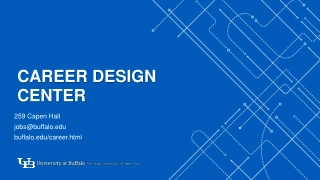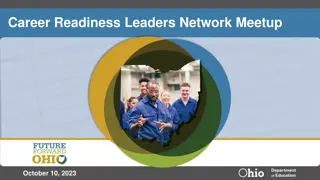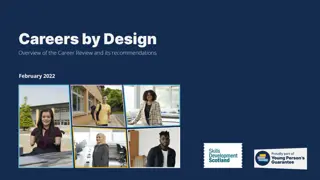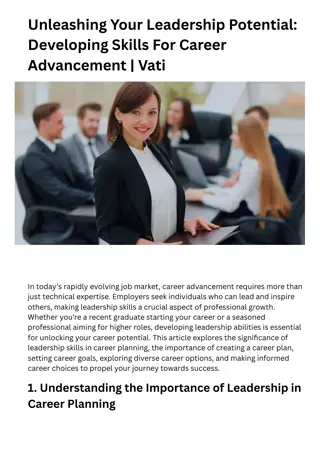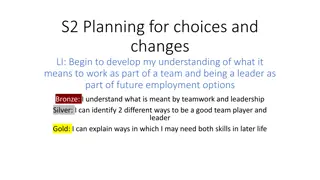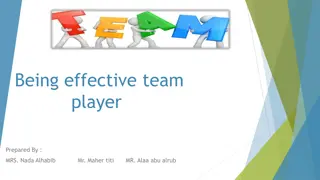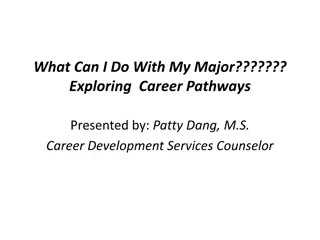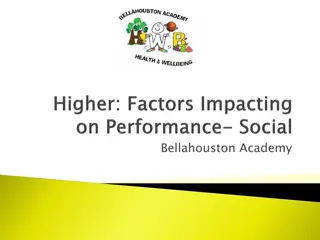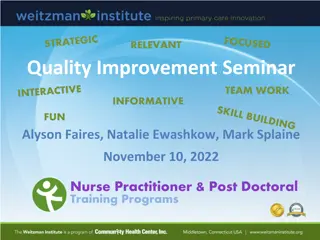The Professionals: Importance of Teamwork and Career Opportunities
In "The Professionals" chapter 2, the emphasis is placed on the significance of teamwork within professional settings such as schools, private practices, and hospitals. The narrative discusses the vital role of interpersonal relationships within interdisciplinary teams and how likeability can impact cooperation. Furthermore, it delves into specific professions like speech-language pathologists and audiologists, touching on the growing employment opportunities in audiology. The content also highlights the concerning issue of hearing loss among young people due to headphone usage.
Download Presentation

Please find below an Image/Link to download the presentation.
The content on the website is provided AS IS for your information and personal use only. It may not be sold, licensed, or shared on other websites without obtaining consent from the author.If you encounter any issues during the download, it is possible that the publisher has removed the file from their server.
You are allowed to download the files provided on this website for personal or commercial use, subject to the condition that they are used lawfully. All files are the property of their respective owners.
The content on the website is provided AS IS for your information and personal use only. It may not be sold, licensed, or shared on other websites without obtaining consent from the author.
E N D
Presentation Transcript
The Professionals Chapter 2
For the exam, you do not have to read:** Starting on p. 24 with Professional Organizations Page 25 There is nothing on the test about professional organizations except for what is on the PowerPoint
II. Interdisciplinary Teams** It is SO important to get along with our teams! How much they like you determines how much they cooperate with you, which has implications for the clients you serve For example, if a teacher doesn t like me, they might give me a lot of pushback about scheduling kids for therapy If the school psychologist doesn t like me, they might not show up to translate into Spanish to test children when they said they would
Reflection--Please turn to the people next to you and spend 2- 3 minutes discussing:** How do you be likeable? For example, bring food/snacks to share occasionally
For audiologists, employment opportunities are growing fast:
https://www.theguardian.com/society/2022/nov/15/one- billion-young-people-risk-hearing-loss-from-loud-music** More than 1 billion teenagers and young adults worldwide may be at risk of hearing loss because of their use of headphones, earphones and earbuds and attendance at loud music venues, a study suggests. An international team of researchers estimate that 24% of 12- to 34- year-olds are listening to music on personal listening devices at an unsafe level .
Not on exam:** Right now, my greatest life mission is services for young children (primarily those in under resourced areas) impacted by the pandemic Statistics indicate that since 2020, speech and language delays in babies and young children have more than doubled In some areas of the world like South Africa, children s speech and language skills are more than 3 years behind
This is one reason (not on exam) That I am soooo grateful for children s books to distribute in the U.S. and overseas
Mainstream U.S. values: It is OK for older people to live in separate medical facilities When partners get together, they should move out of their parents home and live on their own The most successful people are those who are very busy and work hard More money and possessions are a sign of success
But in different cultures:** Does an older person or a child with a disability come from a culture where the family believes they must do everything for them? This family may feel uncomfortable accepting help from professionals Does the person come from a religion where a male therapist may not be alone in a room with a female patient? Does the client come from a religion where they don t believe in Western medicine and they don t want antibiotics for their child with middle ear infections?
To develop cultural competence, we can also:** Be aware of our own values and beliefs Ask students/patients/families to share with you Learn some basic vocabulary in other languages Attend churches, festivals, gatherings of other cultures
Hyter, Y.D., & Salas-Porvance, M.B. (2023). Culturally responsive practices in speech, language, and hearing sciences (2nded.). San Diego: Plural Publishing.
We will focus on providing equity and access to everyone, not just those who live in certain zip codes**
Hyter & Salas-Provance, 2023:** We need to be aware of health equity as well Health equity is the realization of the highest level of health for everyone, and we need to work hard to address health inequality (e.g., lack of health insurance) Health disparities are often associated with social, economic, and environmental disadvantages
Remember intersectionality** The acknowledgement that everyone has their own unique experience of discrimination and oppression We must consider everything and anything that can marginalize people gender, physical ability, race, class, socioeconomic status, etc.



